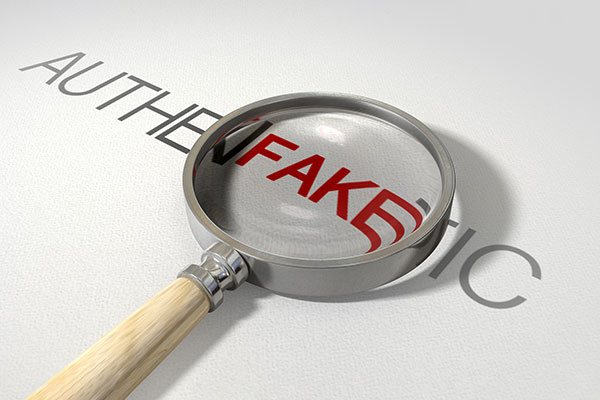Are you buying products on Amazon or eBay? Research by government agencies says that one in 20 of the things you buy are counterfeit. One out of every 20 things! The same is true for industrial buys- parts and raw materials purchased by your procurement department. Counterfeits can be nearly impossible to tell apart from true goods – until they fail or cause harm.
Determining if there are counterfeit products in your supply chain is no easy task. How do you know if you are buying and using true products from your suppliers and distribution channels?
It has become increasingly more difficult to distinguish a counterfeit from the real thing. Owners of brands and intellectual property are losing billions of dollars in revenue every year to counterfeiters that are selling bogus products, often at the same price as the true brand. Using the latest manufacturing and printing technologies, counterfeiters can duplicate finishes, stenciling, print boxes, labels and security codes that mimic those on genuine products.
Professional industrial buyers often have a difficult time in distinguishing genuine products. Tasked with getting the best price and delivery, buyers may be duped into buying counterfeits because they are slightly cheaper. Counterfeiters have learned that charging slightly less for a product versus the true brand, makes the counterfeit seem more real at just a slightly lower price.
To make matters worse, counterfeiters are often part of terrorist organizations that use revenue from sales to purchase weapons or support human trafficking organizations.
Who is harmed by counterfeits?
Let’s be clear here. We are not talking about fake handbags and watches sold on the street corner in New York City. Counterfeits can be found throughout your supply chain. Electronics, aerospace, automotive, pharmaceuticals, printing, and cosmetics are now seeing spikes in counterfeit products sold online. The aerospace and defense industries have taken the lead in fighting counterfeits through product serialization and supply chain control, and through working with Customs and Border Protection (CBP) to stop counterfeit imports.
When counterfeit goods are unknowingly added to supply chains, parts, sub-assemblies, and products can be compromised and consumers may be endangered. The aerospace and defense industries are concerned about counterfeit parts, and so are pharmaceutical and beauty industry companies along with big brand-name consumer products.
We are getting wiser
I attended the A-CAPP Center 2023 Brand Protection Strategy Summit at Michigan State University recently. The conference was full of new ideas and technologies for fighting counterfeits. The Center for Anti-Counterfeiting and Product Protection (A-CAPP) identifies and examines the complex issue of trademark counterfeiting from a practical and actionable viewpoint. The A-CAPP Center is known worldwide for its work in fighting counterfeits. A-CAPP is supporting the introduction of new legislation that addresses counterfeits in global supply chains.
The Inform Consumers Act was introduced to require online marketplaces such as eBay and Amazon to collect data about who is selling goods on their platforms. These new regulations are enforced by the Federal Trade Commission – the organization charged with oversight of trademark laws. Online counterfeit sellers can be fined up to $47,000 per transaction.
This is certainly a step in the right direction, as marketplaces and consumers become more informed and wiser about the products they are buying and from which sellers.
How can you control counterfeits?
The only way to control counterfeiting is to maintain tight control over your entire worldwide supply chain and enforce discipline in verifying supply chain partners and products. This means verifying and monitoring all parts suppliers, distributors, subcontractors, and contract manufacturers.
It simply isn’t good enough to show up at a supplier location once a year and hope for the best. Companies sourcing in China and other countries should go to the manufacturing site often and review the production of parts. There is no substitute for attention to detail in every supply chain link. Know your supply chains from start to finish. Verify and monitor every step of the way.
SC
MR


Latest Supply Chain News
Latest Podcast

 Explore
Explore
Latest Supply Chain News
- AI-driven sourcing: Why the speed of change is going to only accelerate
- A Silk Road city
- U.S.-bound containerized import shipments are up in June and first half of 2024
- Do net-zero goals matter?
- Boeing turned to Fairmarkit, AI to help land its tail spend
- Expand supply chain metrics to cover the complete customer experience
- More latest news
Latest Resources

Subscribe

Supply Chain Management Review delivers the best industry content.

Editors’ Picks




